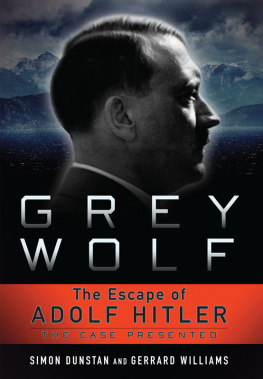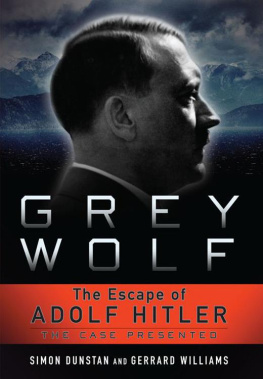The Hitler Escape Trilogy
HITLER In ARGENTINA
The Escape of Adolf Hitler and Martin Bormann from the Fhrerbunker as Told by Nazi Spy Don Angel Alcazar de Velascoand more!
IN A LETTER TO HARRY COOPER IN 1984
First released as Escape from the Bunker
Revised January 2014
Edited by Harry Cooper
Copyright 1984, 2006, 2010 and 2014 by Harry Cooper
All rights reserved by the copyright holder
Pertinent portions of this book may be used in reviews or quoted in scholarly papers without violation of copyright laws if the editors name, book title and contact web address are listed as the source.
Cover art by David Dees at DDees.com
Sharkhunters International
P. O. Box 1539 Hernando, FL 34441
www.sharkhunters.com
Revised 2014

This book has been given a major revision in early 2014. The main text is not revised. It remains verbatim exactly as DON ANGEL ALCAZAR de VELASCO (158-1985) told us in his letter sent to us in the mid-1980s.
That is unchanged because the facts are unchanged so what is revised? We have added some personal letters from DON ANGEL to Sharkhunters around that same time AND many previously classified files from various sources.
DON ANGEL of course, got things started but recently other S.E.I.G. Agents have pulled classified files and sent them to us. This acronym is from S harkhunters E aglehunters I ntelligence G roup.
S.E.I.G. Agent REMBRANDT pulled files for us from the Dutch Secret Service. S.E.I.G. Agent TAUCHER pulled files of the FBI, OSS and CIA from dusty corridors in the National Archives. Top of the group is S.E.I.G. Agent PIZZARRO who pulled countless files from many sources including some forgotten STASI files from the collapsed DDR.
Enjoy this revised book with all the new solid proof that Adolf Hitler, Eva Braun, Martin Bormann and thousands of others of the collapsed Third Reich did not perish in the ashes of the ruined Germany but indeed, lived out their lives in safety and comfort in various South American countries, primarily in Argentina.
Fhnrich!
A Fhnrich is a midshipman, an officer in training. Contrary to popular propaganda, the German officer corps was held to an extremely high standard of honor as we see here in the Code of Conduct written by Vizeadmiral Lohmann, Commandant of the Naval Academy at Mrwick.
______________________________
The following professional and lifetime rules are valid in war and peace. I give them to you; put them to good use.
1. Be example setting in all situations of life, especially in critical hours. You must be an ideal for your soldiers.
2. Always assert the interior and exterior behavior of a soldier. The superior must be the best disciplined man if he demands each subordinate will obey him.
3. Keep your honor unblemished. It is lost when you tamper with it in thoughts, words and deeds.
4. Preserve your courage to the utmost truth. Stand by your words and actions.
5. Be open with your superior, but remain tactful. Observe the sharp border between on-duty and off-duty.
6. Learn from verbal corrections; do not play the insulted.
7. Restrain your judgment on matters which you do not master. The right to critique is reserved for those who have proven that they can do it better.
8. Pay attention to your own posture and behavior on duty and off duty. Only he who masters the common forms of society possesses the image for an officer necessary for successes in presenting himself.
9. Keep your body under control. Strengthen it regularly and maintain it in action preparedness. Self-control and restraint are manly. Letting go of yourself is irresponsible.
10. Restrain yourself from excessive alcohol consumption. It is often the cause for derailments.
11. Do not incur debts. They diminish your joy of life and drive for action.
12. Take advantage of time in your youth to educate and further yourself.
13. Sharpen your mind through periodic intellectual work in all areas, especially in regards to your profession. Immerse yourself in matters of literature, culture and history.
14. Form your own personality on examples of great men.
15. Listen to experienced comrades. From listening and contemplating, you can draw great winners.
16. When you are entrusted with men, always remember how in the past you wanted to be treated in the same situation.
17. Have respect for your superior and subordinates. You protect yourself from troublesome circumstances.
18. Act with common sense and heart. Otherwise you run the danger of losing your authority.
19. Hold the honor feeling of your soldiers as sacred.
20. Avoid harsh language; usually the sign of insecurity.
21. Before giving orders, look very carefully at your people and try to identify the human beings in them.
22. Orders only make sense when they convince and are executable.
23. The language of orders must be plain and penetrate the heart.
24. Keep your crew tightly together. Help each other in effective camaraderie.
25. Often read the book by Sorge, The Navy Officer as Leader and Teacher. It will give you guidance in all questions regarding daily duties.

26. Preserve your belief in your citizens, the German mission and God. Your belief will give you energy for life, combat and victory.
(Sent by Sharkhunters Member WALTER KERN (6345-2001), photo right as a young soldier during the Battle of the Bulge)
EDITOR NOTE - When we can get our heads out of the wartime propaganda and more so out of the really intense post-war fiction, we see that the German officer corps was indeed, extremely honorable.
On the next pages you will read what various people, military and otherwise, thought of the Sharkhunters book series.
Explanation of Membership Numbers. You will note that a Member has two sections to his//her Membership Number. The first is their Member Number in the case of WALTER KERN, it is #6345. The second number denotes the year is which they joined Sharkhunters and in his case, KERN joined in 2001.
TABLE OF CONTENTS
Escape from the Bunker
FOREWORD
My Friend, the Spy
Foreword by HARRY COOPER (1-LIFE-1983)
In this book, we examine probably the biggest mystery of the 20th Century and beyond..did Adolf Hitler commit suicide in the Fhrerbunker or not? The world demanded to know the fate of the three leaders of the Axis powers when the war ended. There was no doubt about the fate of Italian leader Il Duce Benito Mussolini (below left). He and his mistress were caught by Italian communists, brutally butchered and their bodies hung by the heels in a gas station. The world also knew that Japanese war leader Hideki Tojo (below right) shot himself as the Americans closed in on him, but he failed in his suicide attempt. He was nursed back to health then tried, found guilty and hanged.

Next page




















